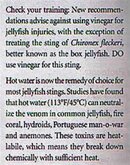- Messages
- 54,122
- Reaction score
- 8,270
- # of dives
- 500 - 999
DAN's "Diver Alert" magazine has long been my favorite periodical read and the May/June 2008 issue (not yet available online) includes "Sting Update" with the surprise recommendation not to use vinegar on jellyfish stings other than the Indo-Pacific Box Jelly.* Since I cannot reference the article online yet, I'm attaching a couple of crude scans.
I have carried a 8 oz bottle in my dive bag for 7 years now, used it a few times - once on myself, wondering why it didn't seem to help; got more relieve from the calamine lotion I tried next. I carried a quart to the beach with my grand kids, but now they tell me not to use it; glad we didn't need to - they're both towheads with more delicate skin than I.
Current suggestions for jellyfish stings include...
1-Flush with sea water, not fresh water;
2-Soak in hot water or hot shower around 113F/45C for 30 to 90 minutes ASAP;
3-Remove any remaining tentacles with tweezers;
4-Shave with shaving cream and razor or scrape with credit card;
5-Apply hydrocortisone cream or ointment - I carry that;
6-Monitor for reaction or infection;
And more. I also carry antihistamine tablets and include those in my personal treatment and suggestions.
I don't know why hot water is #2 on that list as it's not going to be available on most dive boats or beaches, and I think I'd want to use tweezers or credit card to remove as much of the tentacles as possible ASAP - then shave and/or use hot water when I can get to those.
There was a special note on Men-of-War: No vinegar! It actually causes those nematocytes to discharge.
* The one exception given is for the Chironex fleckeri of Box Jelly found in some waters between Australia and Asia. This one is probably the most deadly animal for its size other than man, but if you survive long enough to get back on the boat - do use vinegar on that wound. There are chironex species in and near the Caribbean perhaps, maybe not the same specie - not generally considered the same threat at all. Vinegar may or many not be good with those other box jellies...?
I do strongly recommend $29 DAN membership for all divers even if you insure elsewhere. It's a worthy organization and membership includes the magazine subscription and Travel Assist benefits. See DAN Divers Alert Network - Scuba Diving and Dive Safety Association
I have carried a 8 oz bottle in my dive bag for 7 years now, used it a few times - once on myself, wondering why it didn't seem to help; got more relieve from the calamine lotion I tried next. I carried a quart to the beach with my grand kids, but now they tell me not to use it; glad we didn't need to - they're both towheads with more delicate skin than I.
Current suggestions for jellyfish stings include...
1-Flush with sea water, not fresh water;
2-Soak in hot water or hot shower around 113F/45C for 30 to 90 minutes ASAP;
3-Remove any remaining tentacles with tweezers;
4-Shave with shaving cream and razor or scrape with credit card;
5-Apply hydrocortisone cream or ointment - I carry that;
6-Monitor for reaction or infection;
And more. I also carry antihistamine tablets and include those in my personal treatment and suggestions.
I don't know why hot water is #2 on that list as it's not going to be available on most dive boats or beaches, and I think I'd want to use tweezers or credit card to remove as much of the tentacles as possible ASAP - then shave and/or use hot water when I can get to those.
There was a special note on Men-of-War: No vinegar! It actually causes those nematocytes to discharge.
* The one exception given is for the Chironex fleckeri of Box Jelly found in some waters between Australia and Asia. This one is probably the most deadly animal for its size other than man, but if you survive long enough to get back on the boat - do use vinegar on that wound. There are chironex species in and near the Caribbean perhaps, maybe not the same specie - not generally considered the same threat at all. Vinegar may or many not be good with those other box jellies...?
I do strongly recommend $29 DAN membership for all divers even if you insure elsewhere. It's a worthy organization and membership includes the magazine subscription and Travel Assist benefits. See DAN Divers Alert Network - Scuba Diving and Dive Safety Association






